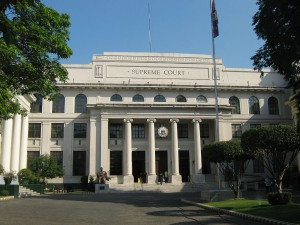Philippine News
SC acknowledged DAP has yielded positive results: Palace

” width=”300″ height=”225″ /> Supreme Court of the Philippines. Photo by Mike Gonzales courtesy of Wiki Commons.
MANILA — The Supreme Court (SC) acknowledged that the Disbursement Acceleration Program (DAP) has yielded positive results that enhanced the economy, but diverged in its interpretation of the Constitution on the fine details of budget execution, Malacañang said.
In a statement issued during Thursday’s press briefing, Presidential Communications Operations Office (PCOO) Secretary Herminio Coloma Jr. said, “We note that the Supreme Court affirmed the authority of the President as Chief Executive to implement the Disbursement Acceleration Program as a stimulus program to achieve economic growth and as an administrative system of prioritizing spending in the execution of the national budget.”
“It is in the interpretation of the Constitution and applicable laws on the fine details of budget execution that the views of the executive and the Supreme Court diverged,” he added.
Coloma further said that according to the Supreme Court, “the implementation of the DAP yielded undeniably positive results that enhanced the economic welfare of the country.”
The Court cited such infrastructure as roads, bridges, homes for the homeless, hospitals, and classrooms as among the “visible” results of the program.
Coloma, meanwhile, noted that in implementing the DAP, the executive branch “exercised good faith and due diligence, in accordance with existing laws and pertinent auditing rules and procedures.”
“We will review the decision further to gain a more comprehensive understanding of its ramifications and study the appropriate legal options,” the Palace official said.
The High Tribunal on Wednesday declared in a 92-page decision that the DAP has violated Section 25 (5) Article VI of the 1987 Constitution.
Among the acts violated were the cross-border transfer of savings of the Executive Branch to augment the appropriations of offices under the other branches of government; and the funding of projects, activities and programs not covered by any appropriation in the General Appropriations Act.





















